Robert Raymer's Blog, page 6
October 27, 2017
INTERVIEW: Robert Raymer Chats with London-based Malaysian Author Ivy Ngeow on Writing and Publishing Two Novels

It’s always an exciting time for a writer when your first novel is about to be published, but when you have two novels coming out from two separate publishers—one a prize-winner in Hong Kong, another crowdfunded in London—that’s really exciting..
Thirty years ago, when Ivy Ngeow was 17, I met her at two-day workshop in Kuala Lumpur conducted by noted Malaysian author K.S. Maniam. Seventeen years later, as an editor for the anthology Silverfish 4, I happened to choose one of Ivy’s short stories. I didn’t connect the writer from the UK with the writer I had met from Johor until she pointed it out to me.
I was fortunate to have read the advance copy of Ivy’s forthcoming novel, Cry of the Flying Rhino, winner of the 2016 Proverse Prize, for her Proverse Hong Kong publisher. The book was written in a lyrical style infused with Borneo folklore, Iban dreams, and peppered with startling fresh similes and metaphors both illuminating and culturally apt....Ivy has an eye for rich telling detail and a deft ear for dialogue. I’m looking forward to reading Heart of Glass.
Born and raised in Johor Bahru, Malaysia and a graduate of the Middlesex University Writing MA program, Ivy won the 2005 Middlesex University Literary Prize out of nearly 1500 entrants worldwide. Her short stories have appeared in two Silverfish New Writing anthologies, in Fixi Novo’s anthology Hungry in Ipoh, The New Writer, and on the BBC World Service. She won first prize in the Commonwealth Essay Writing Competition 1994, first prize in the Barnes and Noble Career Essay Writing competition 1998 and was shortlisted for the David T K Wong Fellowship 1998 and the Ian St James Award 1999. She even won fifth prize (out of 850 entrants) in the 2006 1-MIC (Music Industry Charts) UK Award for her original song, ‘Celebrity’. An architect by profession, Ivy lives and writes in London with her family.
After being interviewed on Ivy’s blog, I’m delighted to return the favor.
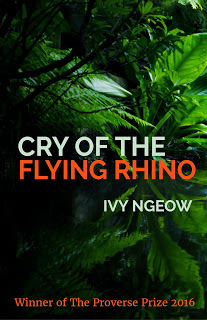 RR: I can’t imagine what’s going through your mind right now knowing that your first and second novels,
Cry of the
Flying Rhino and Heart of Glass, are both coming out in 2017, so please tell us...
RR: I can’t imagine what’s going through your mind right now knowing that your first and second novels,
Cry of the
Flying Rhino and Heart of Glass, are both coming out in 2017, so please tell us...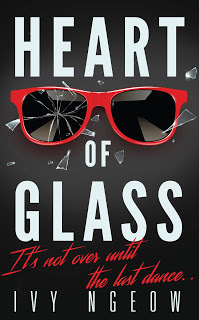 IVY: I feel I am being whacked about the head every morning. I remind myself that although I have had short stories published, I have put in the five ingredients of writing a novel: inspiration, time, effort, commitment and energy. After many decades, in which at no stage was it easy, another journey has begun for me—that as a novelist.
IVY: I feel I am being whacked about the head every morning. I remind myself that although I have had short stories published, I have put in the five ingredients of writing a novel: inspiration, time, effort, commitment and energy. After many decades, in which at no stage was it easy, another journey has begun for me—that as a novelist.RR: About time, I’m sure....I know the feeling all too well and so do plenty of other writers. You’ve also cleverly managed to bypass that whole second novel syndrome—two at one time. Smart! Tell us a little about each novel, their similarities and differences? I know one is set in Malaysia. The other?
IVY: Cry of the Flying Rhino is set in Malaysia and Borneo in the 1990s. The protagonist is a Malaysian Chinese doctor, a middle-class Western-educated professional. However he is entangled in his wife’s past secrets and has to disentangle himself and his family. Heart of Glass is set in Chicago and Macau in the 1980s. The protagonist is a mixed American Chinese girl, a petty criminal, a school dropout who has to find a way of coming clean by taking on a gig abroad in Macau. Both main characters have to find their own sense of belonging; both are decultured in their own natural settings. The themes of imprisonment, displacement, cultural identity and diversity are prevalent in my novels. They are both slightly gothic literary thrillers taking place in the denseness and darkness of cities or jungles at night, steeped in rich cultural references and atmospheric settings.
RR: The settings for Cry of the Flying Rhino were palpable. I was thinking, when did Ivy come to Borneo? Why didn’t she visit me! How did crowdfunding Heart of Glass come about? Was that your idea, the publisher, or is it a new trend that you tapped into—a compromise between traditional publishing versus self-publishing—a win-win, I assume, for both the writer and the publisher?
IVY: I first heard of Unbound, a crowdfunding publisher through a mailing list that I was on and I thought what the hell. I sent them the entire manuscript in October 2016 and they accepted it on 18 November 2016. The idea behind crowdfunding was simply to pre-sell 175 to 300 copies of your book through direct sales. I thought—I can’t do that! I could sell 10. Maybe 20. But then I asked myself, wait a minute, what if I could sell 175 copies? Would I not want that? Why don’t I give it a go? I could always quit if I could not make the target. Since no one, including the publisher, knew what could happen in the future, I signed the contract. If I pre-sold the copies, I would have a real book and an ebook. This was the deal. And it was a top London publisher. I started my crowdfunding campaign on 12 December 2016. The project was fully funded on 30 March 2017.
From the start I knew this is the exact opposite of vanity or self-publishing. No self-published book would exist in a real bookshop even an indie. Unbound’s books do. It can’t be vanity as it was as humble as you would ever have to be. You’re selling your hard work. How to be proud when you’re selling? And in sales, the customer must at least feel comfortable to spend his or her hard-earned money on you. The publisher? Unbound would be editing, designing, copyediting, proofing, publishing, distributing as per tradition. You? The writer? You write the book and you sell the copies. The contract was very transparent and clear. My contact who I was dealing with was friendly, helpful and kind. They were always there to answer my questions or to assist me with the steps I was taking. On top of that, I had access to the Unbound Social Club, the online forum of the authors and a treasure trove of experience, sounding boards, tips and advice.
RR: This all sounds intriguing—you get a publisher, an in-house support group and a social network, something you can plug into at any moment, ideal for isolated writers in the far flung corners of the world like me in Borneo....What are the benefits and the drawbacks to crowdfunding a novel? Do you recommend it for other writers? Would you do it again?
IVY:
Pros: -publication by a top quality London publisher via traditional publishing process-high quality, professional production-access to top editorial team and design team-access to the authors’ forum and network-gaining wide readership or fans through campaigning-gaining new skill of crowdfunding through the process-attract media attention, publicity and promotion-books distributed widely, or by Penguin if hardback-authors get 50-50 with publisher (high royalties) after target reached
Cons:-crowdfunding is direct marketing, sales campaign and self-promotion all in one-not being able to find/reach out to enough readers/investors/supporters/patrons-social media over-use-extremely time consuming-annoying people you know (to buy your book)-annoying people you don’t know (to buy your book)-risk of not reaching target (shame/embarrassment)-no advance-high target
Despite the cons, I would definitely recommend crowdfunding to new authors who have written a truly original piece of work or something which straddles genres (like mine) or something that has a moral heart which is hard to place in the market. For previously published authors crowdfunding would work well if you have an established readership. There are many well-known authors crowdfunding.
RR: With publishing industry being what it is today, I’m not surprised. If a writer can guarantee sales by crowdfunding, it removes a lot of the risk for the publisher; also the writer will be getting that second chance that may have eluded them if their first book or early work, for one reason or another, didn’t sell up to expectations....I was amazed by all these writers whose books had gone out of print, by how quickly they jumped into the eBook market. Suddenly they were back in business, eager to find new readers, putting in the hard work to market themselves, proving to publishers who let their work go out of print—see, I knew I had readers out there; they just happened to be scattered around the world!
Tell us little about your background, growing up in Johor, and what led you into writing at a young age. Do you draw upon that experience in your fiction?
IVY: I was born and raised in Johor Bahru. My house overlooks the Straits of Johor. I attended the local Convent school (Holy Infant Jesus Convent). I was so fortunate that when we moved into the house where my parents still live, one room was filled with the previous owner’s books from floor to ceiling. I did not know what these books were, but I started to read every one of them and by the time I was fourteen I believe I had read them all. There were classics, blockbusters, books on religion, biology, science, maths, astronomy, law, and teaching yourself (French, Yoga, Music, Chinese, Malay, English, Islam, Christianity, Swahili etc). There was even a Kama Sutra (I remember being so horrified as I thought it was yoga!) The books were very old, dating from the forties to the mid-seventies....I could slip into the past quite easily; even now I still see myself as a vintage person.
My mother, who was a school teacher, also brought home six hardback books every week from her school library. She knew I loved humour, mysteries and crime so she brought home Agatha Christie, P G Wodehouse, Enid Blyton books. There was also the Sultan Ismail library which I remember my mother took me to join when I was eight or nine.
RR: Lucky you! My parents weren’t readers, so we had zero books at home. My grandmother, who went to college but my parents didn’t, had a thick children book that I learned to read. Luckily we had a library next door to one of my primary schools (we moved a lot) and a decent library in junior and senior high school and my older brother had books assigned to him in college that I would read. But I was never a voracious reader and envied those who had cultivated that wonderful habit. I didn’t start reading on a regular basis until I backpacked through Europe after university—I would swap books with other backpackers. Nor did I start to write until my mid-twenties.
IVY: I started writing really young. This is pretty much the perfect age to begin living in an imaginary world. Initially it was to entertain my toddler brothers because they were bored with the stories they had heard (so was I), so I started writing down stories that I made up. I found it quite entertaining....I sort of cared and did not care if they liked my stories or not. My only reader was my dad. He was a doctor and quite a serious critical thinker. He would read them and give me feedback on plot or character weaknesses and I remember that I went back to fix the grammar or spelling, but not to improve or change the stories because I just wanted to start a new one. The door to many other worlds opened when I discovered reading and, from then on, I really did not want to look back or to stop to come back to the real world.
RR: I left the “real world” in my late twenties when I moved to Malaysia (after travelling for nine months) to make myself a writer. I had read an autobiography by Norman Hall who had moved to Tahiti and wrote the Mutiny on the Bounty trilogy with Charles Nordhoff, and thought, now there’s an idea! I thought I’d give it two years and if it didn’t work out, return to the company I had worked with....I’m still here, but now living in Borneo....
Living so long in London, do you consider yourself a Malaysian writer or an expat writer or just a writer who happens to be living in London?
IVY: Now that’s tough, Robert! Someone once said patriotism is the love of the food one ate as a child. I have been away too long. I now only have dim glimpses and snatches of details of Malaysian life and culture. I would consider myself a London writer of Malaysian origin.
RR: Me, I’m an expat writer who happens to be American. I felt more Malaysian early on when I was writing the stories that became Lovers and Strangers Revisited, many written from the viewpoint of Malaysians. Then I began working on an expat novel. I wrote two expat novels. Lately, my novels are mostly set in the US....Perhaps, in a way, I’m missing home, though I feel more at home here with my wife and two children (I have a third working in West Malaysia). I have a hard time relating to what is going on in America these days, socially, politically...
Something I do miss is a literary scene. Penang and Kuala Lumpur held literary events now and then, readings, well-known writers from overseas stopping by as part of an Asian tour....I used to meet with two expat novelists and the three of us would get together and exchange our work in these marathon meetings that were fantastic until I accidentally offended one of them, who was very sensitive about her novel (she had a traumatic, war-torn childhood). Then soon after, she moved away. She was very talented and years later her novel sold and did very well in the US and now she has another novel out. I just wished we didn’t have that falling out because we had a good thing going....I did teach creative writing in Penang and Kuching at the university level and that was fun workshopping their stories. We all learned.
Are you actively involved in the London literary scene, regularly attending readings or workshops or being part of a writing group? Does it help with your writing or can it be more of a distraction or an excuse not to write? (I’ll never be as good as so-and-so, or who has time to write with all of these literary events going on?)
IVY: I am in the London literary scene both virtual and real. I prefer real face to face interaction as opposed to online groups. For example, I am attending the Brixton Book Jam this month. I am also a member of the South London Writers’ Group. I joined the City Lit Writers’ Club when I first arrived in the UK and I completed my MA in Writing at Middlesex University. Let’s face it, writing is a solitary profession. I attend groups or workshops when I am not writing or need motivation, encouragement or just a drink, without any real aim. I am attending the London Lit Lab in Hackney in October for a weekend workshop which I am really looking forward to. Meeting writers in the flesh is the most inspiring experience. I meet my fellow Unbound authors every few months or so in a pub room in London. Online I am a member of Facebook groups such as the Book Connectors, The Crime Book Club and the Unbound Social Club. These are fine, but they are still social media and can suck up time. There is no end to it.
RR: How do you keep yourself motivated to write novels, especially when you feel the novel is not going as well as you had intended? Do you share your early drafts with other writers or friends? If so, is it encouraging or discouraging?
IVY: It is never going as well as intended. No first draft does. I am just a simple jovial pessimist like any other writer. For me the first motivation comes from turning up at the job. If I just sit there, and think, it’s already a hundred per cent better than not sitting there and thinking, even if I do not write a word. If you can’t think, you can’t write. And if you don’t think, you will write rubbish. The second motivation comes from knowing the ending. I have to know the ending for me to proceed. Better still, I need to know the “twist” at the end (but this is just a bonus). I don’t share any drafts with anyone. Period. I trust my own instincts to get to the end of the first draft and do at least another two before it’s ready.
The reason being I got my fingers burnt by an early experience. About twelve years ago I was very nearly signed by a prominent agent. She read the first 10,000 words of my novel and said this is the most amazing thing she had ever read, was thrilled to bits and she asked to see “the rest”. I was even asked to go in to their very grand offices in Soho Square. You can imagine my excitement, stupidity and naiveté. However, I had not written this mysterious thing called “the rest”. In a big rush I completed the novel and showed her the worst first draft ever known in publishing history. I was dropped. She did not even return my calls. And “the rest” as they say is history.
RR: Sorry, I had to laugh. It reminded me of Lisa Jewell who, on a bet, wrote three chapters of her first novel Ralph’s Party and submitted it to an agent, who then requested “the rest”. Taking it on faith that she “had” an agent, she rearranged her life and for the next year wrote “the rest” and hand delivered it to this agent who was flabbergasted when she showed up at her office. You just don’t do that, and a year later! No shame! Lucky for her, the book was well written and it launched her career. Sometimes you just have to write on faith that someone really wants your book and is willing to wait a year to receive it! You just have to make sure it’s worth the wait! Rushing your work to pass to someone, as you and I and others have learned the hard way, merely backfires. Get it right first because you only get one shot to make a first impression—impressing the right agent.
You learn by writing (and rewriting), by finishing, and by submitting...
IVY: What a way to learn, but in those days there was no social media or any kind of detailed advice that you could get about the submission process. You just bungle along and learn as you screw up. That book became my first novel Cry of the Flying Rhino after 14 drafts and 12 years and won a prize. Heart of Glass went through nine. I am getting better at doing fewer drafts because I am thinking clearer with each draft, rather than randomly drafting and changing direction with every whim. I am aiming for five to seven drafts for my third book, which I am now a third of the way through.
RR: Is it a sequel to one of the other two novels, or is it a stand alone? Can you tell us a little about it?
IVY: It is a modern literary suspense novel told in multiple voices and viewpoints on the themes of memory and loss. A vulgar wealthy London banker in his early fifties leaves his wife and daughter for a hedonistic lifestyle under the pretext of a career move to Singapore. He gets a Thai girlfriend, a yacht, a luxury penthouse and lives the dream until one day there is a storm. He crashes the yacht and is shipwrecked. He loses his memory and when he gains consciousness he has to live the life of the person they “think” he is.
RR: Sounds intriguing, especially if they are manipulating him for their personal gain! I’ve met expats like that, who end up ruining their lives (and their families). Some work out okay, but many gets played by their “girlfriend and girlfriend’s family”, or end up losing their high flying job over a low lying maid or a prostitute, forgetting why they came to Southeast Asia in the first place (to advance their career), drawn into that hedonistic lifestyle. Some end up as a drug addict, in prison or dead. I guess it was fun while it lasted... sad, though. Somerset Maugham wrote about them, too....Some people just never learn. Good luck with your book.
Tell us about your typical day or week as a writer. Do you anticipate any major changes in your working schedule once your books come out?
IVY: I don’t have a rigid routine as my day job number one, being a freelance architect, is deadline-oriented. Also if I wake up with an interesting dream, I will write that down instead. I am a slow writer. I can’t do what other people do such as write 2,000 words at a go, per day. If I manage 500 I am really ecstatic. I try to write by hand about 10 to 30 minutes when I wake up (in the winter months at 06:45 or 07:00 if I am lazy; in the summer months 05:45). Using my trusted fountain pen, it could be stream of consciousness type thing or it may be just thinking and note-taking. I stop and I make the children their breakfast before they go to school and do my day job number one, where I have a degree of flexibility. In mid morning to mid afternoon I usually cannot write a word so I may as well work.
On Tuesday and Wednesday afternoons I teach music (piano or guitar) to children and adults. This is my day job number two. I really love my jobs and I don’t know what to do without them as they are a great displacement activity from writing. After cooking and eating dinner and the children’s bedtime, I may bash away again for another thirty minutes to an hour. A writer never really stops working, so while I may not be writing, it still counts as my thinking time. Once my books come out, I anticipate cutting back on new projects or commissions for my day job number one. I would like to be writing in the day time for longer periods. This would be for me living the dream. Writing is like having homework forever and ever.
RR: I laughed out loud. My children, age 10 and 12, refer to my writing as homework, something they can relate to. “Don’t disturb Daddy, he’s doing his homework!” In a sense, it’s true. I’m working from home; hence homework! Now and then they get a glimpse that maybe what I’m doing is important like when a French crew recently came to my house to interview me while filming a documentary on Somerset Maugham in Malaysia for the Franco-German Cultural Channel Arte.
What advice would you give your 17-year-old self before you attended that first workshop in Kuala Lumpur? What would you have done differently? Also, what advice would you give to an aspiring novelist just starting out?
IVY: I would tell myself to not have so much fun and at least be taking notes or collecting name cards. What I would have done differently: I would have not used writing as a past time or a subsidiary extension of reading, rather taken it more seriously. I did not know that you could take it seriously or be taken seriously. I thought that writing was something that you stumbled into like Alice down the rabbit hole. What advice I would give to an aspiring novelist just starting out: Firstly, read, read, read. Read anything and everything. Secondly, nothing has changed—the five ingredients still apply—inspiration, time, effort, commitment and energy. Thirdly, don’t obsess about social media. It really doesn’t matter. Only the writing matters.
—Borneo Expat Writer
Amazon links for Ivy Ngeow's books will be added when available.
Ivy Ngeow interviewing Robert Raymer
Five part Maugham and Me series
Published on October 27, 2017 01:31
October 4, 2017
Taking the Expat Exit – Finalist 2017 Faulkner-Wisdom Novel Awards—second year in a row!
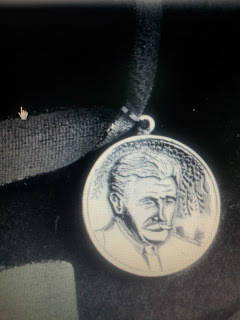
For the second year in a row, my novel Taking the Expat Exit (formerly A Perfect Day for an Expat Exit) was named finalist for the 2017 Faulkner-Wisdom Novel Award. (In 2014 it was also a short-list finalist and a finalist 2012!) “The MusicalTree”, an excerpt from the novel, was recently published in French. In 2015, the sequel The Girl in the Bathtub (formerly Caught in a Mousetrap: Expats at Play), was also a finalist (and a finalist for 2012 Novel-in-Progress category). Both are set in Penang, Malaysia.
An Unexpected Gift from a Growling Fool, was also named a semi-finalist this year, though it was a short-list finalist in 2013! In the past, another novel The Resurrection of Jonathan Brady was a short-list finalist in 2014 (and Quarter-finalist in 2012 Amazon Breakthrough) and my novella The Act of Theft, a finalist in 2014 Novella category. At least I’m persistent!
This year Faulkner-Wisdom had 502 full-length novel entries, so competition was fierce. Although judging can be subjective from year to year, my two Malaysian-set novels keep striking a chord with the judges. Every year since 2011 at least one of my Malaysian novels has been a finalist or a short-list finalist for the Faulkner-Wisdom Novel Award. Not a bad track record….After getting some encouraging feedback from a US agent recently, along with an insightful critique of Taking the Expat Exit that pointed me in the right direction, I plan to rewrite the novel after finishing the first draft of a new book that I’ve been working on.
I’m also planning to do a series of dialogue type of interviews with other novelists that I have met, starting with London-based, Malaysian author Ivy Ngeow who has her first two novels coming out this year (one of which was crowdfunded in the UK). She had interviewed me back in July after I read the advance copy of one of her novels, and has been quite busy working with both publishers. Should be exciting.
—Borneo Expat Writer
Published on October 04, 2017 20:44
July 30, 2017
Payah, a Gift from Children's Author Margaret Lim
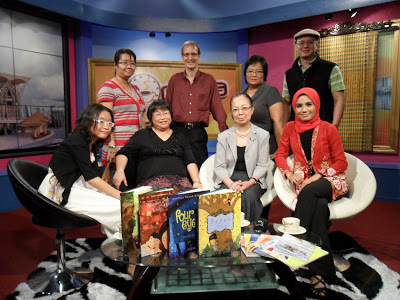
In May 2010, I met Margaret Lim, a Malaysian-born Canadian children’s book author, while we were waiting to be made-up for our TV appearance on Kuppa Kopi, a talk show with Sharnaz Saberi. We exchanged books; in fact she generously gave me all four of her Payah books. She autographed them for my two children Jason and Justin.
Afterwards we went out for tea. Her son asked me to give her a ride while he picked up another friend and the four of us spend the afternoon getting to know each other while talking about books and blogs and exchanged tips about Sarawak.
Later, while watching myself and Margaret Lim on TV1 (her segment followed mine), my son Jason, who was six at the time, pointed to the TV screen at Margaret Lim’s children book series about Payah, and said, “Daddy, that’s my book!” He called over Justin, who was three and a half, and they both stood in front of the TV, excitedly pointing at their four newest books.
“Is that the woman who gave me the books?” Jason asked me.
“Yes, and she wrote the books, too!”
He studied her with awe. I’m sure he’s going to remember Margaret Lim and that moment for a long time. But me, I’m just his daddy who happens to be a writer, though I was also on TV—not that he gave a hoot! In fact he and Justin were both upset with me for changing the channel until he noticed Margaret Lim’s books were on TV. The power of books!
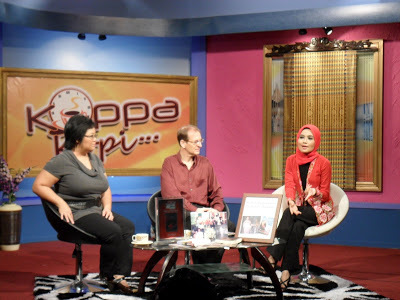 Georgette Tan, Robert Raymer and Sharnaz Saberi
Georgette Tan, Robert Raymer and Sharnaz SaberiThe following May, I was sad to hear that Margaret Lim Hui Lian had passed away from cancer. Although we had kept in contact via email and commented on each other’s blogs, I never saw her again.
Her Payah series, however, still live on in our house. In fact, I made this past week Margaret Lim week! I had Justin, now ten, reread the books (he’s the reader in the family and had read them before, even though they were meant for children age 12 and above). I then had Jason, who turned thirteen, read all four of the books to me while I drove him to school (he’s now in Form One, attending the afternoon session), while I reread all four waiting for a couple of doctor’s appointments—I was glad I had them in the car! I had also read them to the children seven years ago.
The Payah series, consisting of four hard bound books, were based on recollections of Margaret’s childhood, which she spent with the native people deep in the interior of Sarawak on the Island of Borneo. The books were beautifully illustrated by her daughter Su Jen Buchheim and published by her own company Fairy Bird Children's Books, where I believe they can still be ordered.
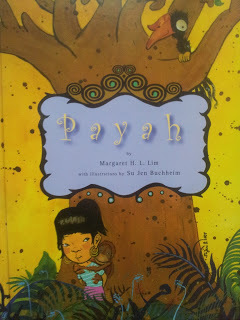
The Borneo Post called Payah, “A uniquely Sarawakian children’s book that will fire a child’s imagination. A must read for all!”
PayahPayah is about a fearless Kayan girl called Payah, who has a soft heart for small helpless creatures. Deep in the rainforest of Sarawak, Payah rescues a hornbill and a mouse deer, while still taking care of a baby orangutan.
Four EyesPayah makes a surprising discovery, and takes on a responsibility that becomes almost too much for her to bear when she befriends a run-away.
Precious Jade and Turnip HeadPayah celebrates Chinese New Year with her classmate, Precious Jade, and her little brother Turnip Head, who keeps getting himself and Payah’s friend into trouble.
Nonah, or The Ghost of Gunung MuluPayah befriends Nonah, after she joins her parents who teach in the rainforest. They win a trip to Mulu Caves, where they help to unravel a plot to steal rare orchids.
Thank you, Margaret, again for your precious books, a gift that our family will continue to treasure. I’m sure when Jason and Justin grow up and have children of their own, the Payah books will be waiting for them. In fact, I’ll probably be the one who’ll introduce them during another round of Margaret Lim week…
*Here is an updated website created in the memory of Margaret H.L. Lim, called Maggie’s Books and Recipes.
—BorneoExpatWriter
Maugham and Me
Published on July 30, 2017 01:50
July 21, 2017
“The Musical Tree” published in French!
“The Musical Tree” was just published in French, on editions GOPE website. Editions GOPE is my French publisher for Trois Autres Malaisie, the French translation of Lovers and Strangers Revisited . They are doing a series of short pieces by their authors on Southeast Asia, their specialty.
“The Musical Tree” is an excerpt from my short story, “Following the Cat” which was published in Themain the USA and Off the Edge in Malaysia, which itself is an excerpt from my Penang novel, Taking the Expat Exit, a finalist in 2016 Faulkner-Wisdom Novel Awards. I’m still waiting for the 2017 preliminary results, which should be out in August. Winners won’t be announced until late November.
Here is the English version of “The Musical Tree”:
We stopped at a shady area serviced by several hawker stalls and drank from coconuts. A dozen cats lay around in idle repose while waiting for their next meal. A white cat climbed onto a chair vacated by two Malays and put its paws on the table to survey the leftovers. A mewing gray kitten waiting below asked it to hurry up. A strange looking tree caught my attention. Then I realized it wasn’t a tree, but a composite of two trees. The one on the inside was old with a dark knotted trunk, while wrapped around it was a younger tree with light, smooth bark. The upper branches of the two trees were so intertwined it was difficult to distinguish one from the other. I pointed it out to Jeya, who was eleven years old and had befriended me. I asked her about it. “Oh that. That is a musical tree,” replied Jeya. “A what?” “A musical tree.” She finished her coconut and said, “Come!” She led me to the tree and asked me to sit on the seawall beneath it. “Now listen.” She cupped her ear. “Hear it?” Dozens, if not hundreds, of birds were singing all at once, a symphony in full swing. I closed my eyes as I listened to the magic. “You can hear them, but you cannot see them, am I right or not?”The foliage was so dark and dense, it was impossible to see anything. “It must drive all the cats crazy,” I said. “Cats are crazy,” replied Jeya, and laughed. “Every day the musical tree comes alive. Every day a free concert.” Two of Jeya’s classmates waved as they passed by. She scampered off to join them. Already I was missing Jeya’s company….The longer I sat under the tree listening to the birds, the lonelier I became….A young Malay couple walked by holding hands. The boy said something to the girl and she boxed him on the arm. He grabbed his arm and feigned pain. Both of them laughed. She hit him again. They were young and in love, just starting out in life. In comparison, I felt old—not yet thirty but already facing divorce. A Chinese derelict reeking of alcohol and urine sauntered over, uninvited. He sat down beside me and eyed the driftwood between us. I tried to ignore him, expecting the derelict to hit me up for money. Why were children so giving, and adults, demanding? “You like the birdies?” He pointed up at the tree. “The birdies sing for themselves, you know. They sing ‘cause it makes them happy. If only people could sing without needing someone to hear them they might be happy, too.” A black cat stirred. It paused in mid-stretch to look at me. The cat began to walk away. Again it paused as if to see if I were coming. I excused myself from the derelict and followed the cat. It seemed to know where it was going. For now that was good enough for me.# # #
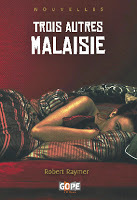 For those who read French: Book orders for Trois autres Malaisie. E-book orders.
For those who read French: Book orders for Trois autres Malaisie. E-book orders.
Here's a link to the intro and excerpts, and to four reviews of Trois Autres Malaisie ineurasie.net, Malaisie.org, easyvoyage.com, and Petit Futé mag .
Here’s also a link to my Maugham and Me series (in English) that I wrote when asked to take part in a French documentary on Somerset Maugham which was recently aired on the Franco-German cultural channel Arte on 5 June 2017 and still can be viewed here for another week or so before Arte takes it down from their website...
—Borneo Expat Writer
Published on July 21, 2017 03:38
July 18, 2017
Being Interviewed by author Ivy Ngeow
It’s always an honor to be interviewed, even more so when the writer doing the interviewing, is London-based author Ivy Ngeow, who will have her first two novels published in 2017! Not bad for someone I met thirty years ago at a workshop in Kuala Lumpur when she was only 17!
I met Ivy together with an aspiring poet, named Jeya, and the three of us hung out together that first day of the two-day workshop conducted by noted Malaysian author K.S. Maniam. Jeya, by the way, featured in my short story, “Teh-O in K.L.” from Lovers and Strangers Revisited, which I blogged about in my story-behind-the-story series. So I have always associated the two names together, Ivy and Jeya, which I did 17 years later, when I happened to choose a story by Ivy for Silverfish 4 when I was the editor.
Having read the stories blind and then notifying the winners, I was surprised to learn that this writer from the UK named Ivy was the same Ivy from Johor that I had met all those years ago. Ivy even mentioned Jeya’s name—both, of course, had read the story.
Having read the advanced copy of one of Ivy’s forthcoming novels, Cry of the Flying Rhino, winner of the 2016 Proverse Prize, for her Proverse Hong Kong publisher, I’ll soon be returning the favor by interviewing her, which should be a lot of fun getting reacquainted after all these years and learning about that other soon-to-be-published novel, Heart of Glass!
But for now, here is Ivy’s interview of me...
Being interviewed, I can’t help but think of being interviewed about Somerset Maugham for the Franco-German cultural channel Arte, which aired last month, that I blogged about in my five-part Maugham and Me series.
Here’s to future interviews for both Ivy and me and all those writers, Malaysians and expats alike, who deserve to be read, published, and interviewed.
Congrats to Ivy for her two forthcoming novels! Wishing her all the best!
—Borneo Expat Writer
Published on July 18, 2017 03:48
July 5, 2017
Popular Bookfest Horror Writing Workshop (The Star, 30 June 2017)
 Here is a link to the pre-workshop write up about the various speakers.
Here is a link to the pre-workshop write up about the various speakers. Here is a link to their 2016 workshop. And the 2015 workshop.
And to my recent five-partMaugham and Me series about being filmed for the Franco-German channel Arte in June 2017.
—BorneoExpatWriter
Published on July 05, 2017 00:20
June 22, 2017
Popular Bookfest Horror Writing Workshop (The Star, 20 June 2017)
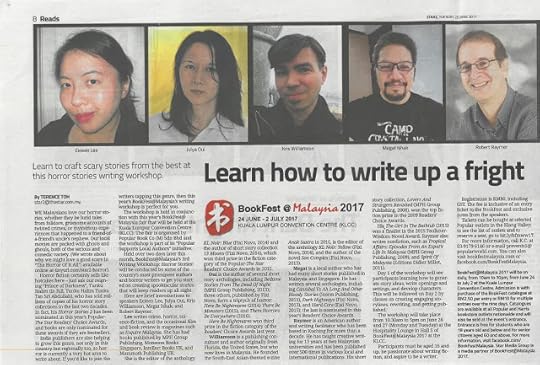
Here is a link to their 2016 workshop. And the 2015 workshop.
And to my recent five-part Maugham and Me series about being filmed for the Franco-German channel Arte in 2017.
—BorneoExpatWriter
Published on June 22, 2017 22:43
June 11, 2017
From Hari Raya to Somerset Maugham
Every year, around this time, I usually get an extra reminder that Hari Raya is coming up. This year was someone’s Facebook posting of the opening pages to my short story “Home for Hari Raya” from Lovers and Strangers Revisited. The story was adapted into a film by Ohio University’s School of Media Arts & Studies.
Led by Associate Professor Frederick Lewis, a team of students came to Malaysia for the filming and worked with Universiti Teknologi MARA (UiTM), in Shah Alam.
Other than writing the original story (and the story behind the story), I helped to edit their screenplay. I had hoped to meet the team at UiTM, but we had a scheduling conflict and I missed out…
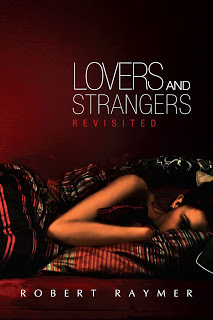
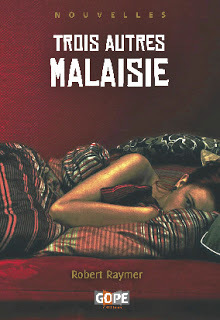
But this year, I was thinking about "Home for Hari Raya" for another reason due to another filming project that I recently became involved with courtesy of Somerset Maugham. The French translation of Lovers and Strangers Revisited, which became Trois autres Malaisie, had attracted the attention of Laure Michel who contacted me from France about her documentary Sensual Malaysia of Somerset Maugham for Arte, a Franco-German cultural channel, which aired on 5 June 2017.
In my five-part series, Maugham and Me, I blogged about the behind the scenes look at not one but three documentaries that she and Richard Cloue had filmed while in Sarawak. I then blogged about watching the films, adding links to all three projects. (The links will remain online until early August 2017, so if you come upon this after that, the links may be gone.
So for all Malaysians who celebrate Hari Raya, Selamat Hari Raya! And for the rest, enjoy the Open Houses and the holiday!
And if you have an interest in Somerset Maugham and/or Sarawak, here are the links (with some great photos) to the five parts of Maugham and Me: Part I, Part II, Part III, Part IV, Part V
—BorneoExpatWriter
 For those who read French: Book orders for Trois autres Malaisie. E-book orders.
For those who read French: Book orders for Trois autres Malaisie. E-book orders.
Here's a link to the intro and excerpts, and to four reviews of Trois Autres Malaisie ineurasie.net, Malaisie.org, easyvoyage.com, and Petit Futé mag .
Published on June 11, 2017 00:40
June 5, 2017
Arte: Watching the French Documentaries on Maugham, on Pepper, and on Peter’s Personal Invitation.
While watching the French documentaries that Laure Michel and Richard Cloue did for the Franco-German cultural channel Arte on Somerset Maugham, on Sarawak Pepper, and on Peter John Jaban’s Personal Invitation on the upper Sarawak River, I realized that the vast majority of the footage they had shot was left unused. There is only so much footage you can use when there is a severe time restraint. Something has to go—often 90-95 percent!
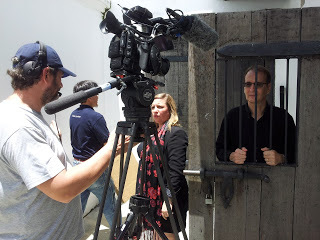
They even cut out the jail sequence!
Of course what’s also missing are the behind-the scenes drama that I had blogged about in my five-part series Maugham and Me: whether to shoot at Fort Margherita or the jungle; whether they could film me inside the jail; whether my house would be suitable for filming (and when and how many were coming!); whether the rain would stop so they could finish Peter cooking in bamboo at the edge of a river; or whether there was enough daylight to finish the Maugham shoot.
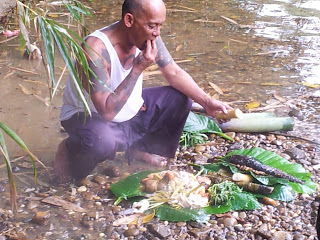
Then there was Michel Viet losing his drone (and could they find another before he returned to France), plus his jumping into the bloated river in a gallant effort to save the drone (plus all that great aerial footage) at great personal risk to himself.
Then came that somber, drone-less ride home in the longboat before Richard decided to liven it up with some photos of us.

Also missing for Laure and Richard were all the weeks, months of hard work, the advance planning, the preparations, the travelling to Malaysia and Borneo, and the post production work of putting it all together and making difficult decisions: what to cut, what to leave in, and the sequencing to make the documentary easier to follow and entertaining for the viewers.
Of course, if this was an hour program, they could cram everything in, but all that footage from three separate venues in Sarawak (and outtakes in the jungle), plus Kuala Lumpur and Malacca, in the Maugham story alone, had to be compressed into a little more than 12 minutes!
Because the programs were in French—unless you speak French—it was difficult to follow what was being said in English since it would get drowned out once the French translation kicked in. Still, in any language, it was visually stunning to watch and fun for those of us involved, to see how they pieced together each documentary. In Sarawak they shot three in five days, and on one day, they worked on all three!
Naturally, I enjoyed watching myself (I come in around the 10 minute mark, but I kept wondering, did they cut me out altogether!) and then seeing my wife (the boys got cut) and others that I recognized. Hey, that’s Bernice! And Serge! Then from the other films, there is Karen! And Peter!
As I watched the Maugham story unfold, I kept looking to see how much footage they actually did use. I especially wanted to see if that sunset through the jungle on the upper Sarawak River at Kampong Git that had so mesmerized us had the same magical feeling on film or if they even included it! They did, but the real magical part, that red glow throughthe jungle was too dark to film. Richard, who was further back, did manage to shoot it above the jungle.
Still, what a wonderful feeling to be a part of such a cross-cultural experience—from France to Borneo—that came right out of the blue and ended in that stunning sunset along the upper Sarawak River.
—BorneoExpatWriter
Below I posted the links to all three videos, though I was told that the videos would only be available on line until early August ’17, so if you come upon blog later than that, the links may be gone (though it might be available elsewhere will some diligent googling). For now enjoy:
Sensual Malaysia of Somerset Maugham (12.19 minutes):
Sarawak Pepper (12 minutes):
Peter’s Personal Invitation (4 minutes):
And for the five-part Maugham and Me blog links: Part I, Part II, Part III, Part IV,
Part V
 Book orders for Trois autres Malaisie. E-book orders.
Book orders for Trois autres Malaisie. E-book orders.
Here's a link to the intro and excerpts, and to four reviews of Trois Autres Malaisie ineurasie.net, Malaisie.org, easyvoyage.com, and Petit Futé mag .
The ARTE TV report will be broadcasted on June 5th: http://www.arte.tv/fr/videos/071100-062-A/invitation-au-voyage. It will be available online until August 4th!
Published on June 05, 2017 22:55
June 2, 2017
Arte: Somerset Maugham and Me—Losing a Drone and Finishing Maugham—Part V
 Richard Cloue, Peter John Jaban, Michel Viet, Robert Raymer, Laure Michel, and Bidayuh boat owner!
Richard Cloue, Peter John Jaban, Michel Viet, Robert Raymer, Laure Michel, and Bidayuh boat owner!While filming the departure and arrival of Peter and the Bidayuh on the longboat, Michel used his drone for the full river shots. Michel also had the drone follow the longboat down river. Our view was obscured by an overhanging tree. Then disaster struck. The drone, according to Peter, had collided into an overhanging branch on the opposite side of the river, and dropped.
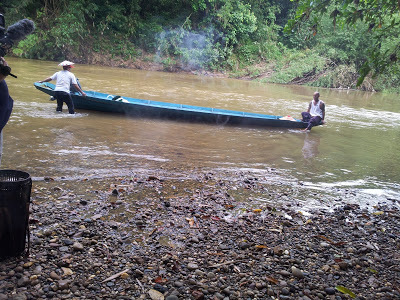
Peter had expected it to float on the river and was waiting to capture it, but instead, it sank. The river was too deep and too muddy to see. The Bidayuh cast his fishing net several times but failed to catch it.
Meanwhile, Michel, in panic mode, handed me his glasses and shirt and went into the river to see if he could retrieve it himself. Although understandable, I thought it was a really bad idea….This is where serious accidents happen; the river’s current was swift from the recent rain and Michel was not young at age 68.
Luckily for Michel, Peter and the Bidayuh made sure nothing untoward happened. Eventually, all three of them returned to us, though saddened by the loss. Not only was the top-end drone gone (that cost 700 Euros), they lost all that great footage on the river.
When I handed Michel his shirt and glasses, he looked at me with startled surprise.
“I thought I had lost them.”
As we were about to leave for Kampung Git, there was some concern that there were too many of us to ride safely in the longboat—although long it can be quite unsteady getting in and out. Again, I felt like an extra tire that wasn’t supposed to be there. Once the six of us settled in with all the gear, with Richard at the helm so he could get in some river shots, we were fine.
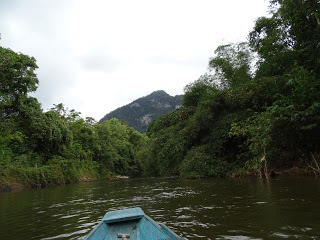
Getting out though was another matter; when Michel got out, the longboat rocked and I, in the midst of getting up, landed on my back. I was just glad I didn’t end up in the river.
With the light fading and time running out, since they were scheduled for the pepper farm shooting the next few days, this was their last chance to finish the Maugham shoot, so Richard had me sit on some boulders, with the river and the longboat as a backdrop.
I talked about the characters in some of Maugham’s stories, who came out here between the wars, adapting to life on the lonely outposts alongside Borneo rivers, surrounded by jungle, feeling at times euphoric, like a king among his far-reaching district, his domain, not seeing another Westerner for months at a time. For some, this was the life; for others, they buried their loneliness, their misery, and their unsuitability for the task (even their incompetence) by getting drunk.
In the preface to the Completed Short Stories, Vol. III Maugham wrote, “England was very far away and when at long intervals they went back was increasingly strange to them. Their real home, their intimate friends, were in the land in which the better part of their lives was spent.”
As an expat, having spent half of my life in Malaysia, I could relate.
While some of the district officers and other expats went “native”, others took the opposite extreme, dressing up for dinner every evening, even when dining alone in a remote administrative outpost surrounded by the Borneo jungle, like Warburton in “The Outstation” who felt, “When a white man surrenders in the slightest degree to the influences that surround him he very soon loses his self-respect, and when he loses his self-respect you may be quite sure that the natives will soon cease to respect him.”
Regarding “Flotsam and Jetsam”, Maugham wrote, “It was rather absurd, and somehow sinister to see the social pretense in those poverty stricken surroundings on a Borneo River.”
Maugham himself admitted, “I never felt entirely myself till I had put at least the channel between my native country and me.”
Maugham also wrote in one of his later novels, “I want to see life and death, and the passions, the virtues and vices, of men face to face, uncovered.”Here in Maugham country, he found it and exposed it in his short stories.
Richard told me there was no more light to film, but I was on a roll and wanted to keep talking, to finish answering the questions that Laure had showed me earlier. I suggested that, although they couldn’t see me, they could continue filming for the dialogue, which they could then use as voice over for earlier shots of me walking here and there in the jungle. Laure agreed so I continued to talk in the fading light.
I had just finished, when suddenly, unexpectedly, on the opposite side the river the jungle lit up red from a stunning sunset. Excited, Richard asked me to stand at the edge of the river, facing the sunset, while I talked about being in the moment, feeling mesmerized yet also euphoric standing there in the silence in near-darkness, alongside the upper Sarawak River…
I became this silhouette against the river and the jungle amid this amazing afterglow of red. I also felt what those lonely district officers must have felt when they witnessed the same beautiful sunset.
Later, I texted my wife to relate what happened to Michel’s drone. When I reached home, the boys were sad and expressed their concern for Michel, whom they referred to as “master of the drone.”
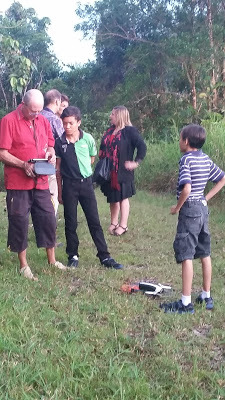 "Master of the Drone" Michel Viet with Jason, Laure, and Justin
"Master of the Drone" Michel Viet with Jason, Laure, and Justin“Did Michel cry?” Justin asked me.
I said, “No,” but I told them about his gallant effort to save his missing drone at great personal risk to himself.
I had suggested to Karen that perhaps she could borrow or rent a drone for the pepper shots. She knew some people who had drones, and was able to borrow one, so the filming continued on schedule….On Thursday evening, after the pepper story was complete, Laure asked me to join them for drinks at Grand Margherita and seafood at Top Spot. It was fun seeing them again and hearing about the rest of the shoot.
But now it was time to say goodby, at least for now, to Somerset Maugham. Although I was not paid for my part in the filming and went into it fully understanding that, (though hoping some money might materialize), I was rewarded many times over by renewing some friendships, for the excitement the filming brought to my children (especially seeing a drone up close and in operation), for the opportunity to go upriver on a longboat (thanks, Karen!) and watching Peter cook this marvelous dinner in bamboo on a tiny pebbled beach at the edge of river.
For me, being able to break out of my routine, to take step back from writing in isolation and realizing there’s a big world out there in my own backyard—Borneo—felt awfully good.
The following days, as I reflected back over those moments of being filmed talking about Somerset Maugham in three distinct settings, I wasn’t so concerned about how I would come across, how quotes could be misconstrued or even taken out of context to fit the documentary’s or even the listening audience’s preconceived ideas about Maugham or life here in Borneo...
Instead I thought of that sunset, the vivid color of red glowing in the jungle. For me, that was the perfect ending for a magical two days of filming that literally came out of the blue.
—BorneoExpatWriter
Link to Part I, Part II, Part III, Part IV
 Book orders for Trois autres Malaisie. E-book orders.
Book orders for Trois autres Malaisie. E-book orders.
Here's a link to the intro and excerpts, and to four reviews of Trois Autres Malaisie ineurasie.net, Malaisie.org, easyvoyage.com, and Petit Futé mag .
The ARTE TV report will be broadcasted on June 5th: http://www.arte.tv/fr/videos/071100-062-A/invitation-au-voyage. It will be available online until August 4th!
Published on June 02, 2017 19:45
Robert Raymer's Blog
- Robert Raymer's profile
- 3 followers
Robert Raymer isn't a Goodreads Author
(yet),
but they
do have a blog,
so here are some recent posts imported from
their feed.



